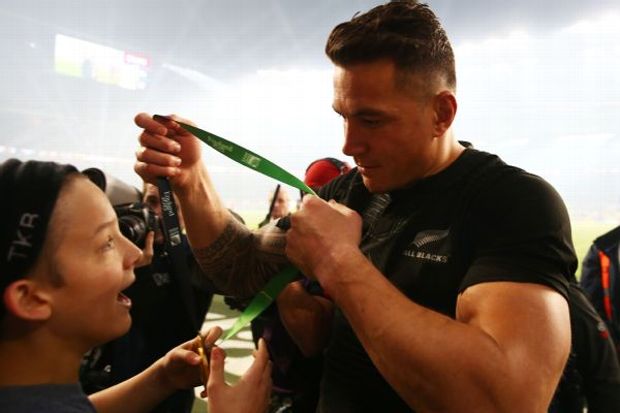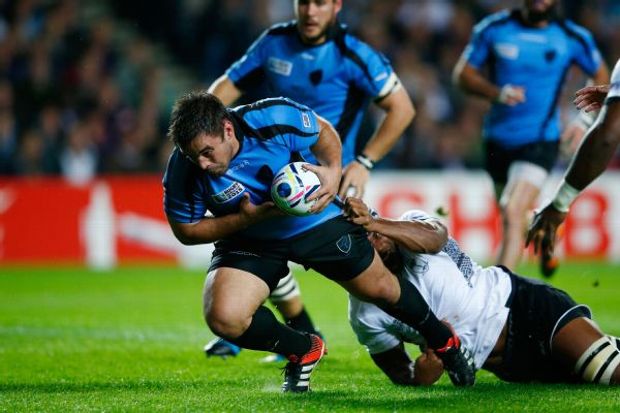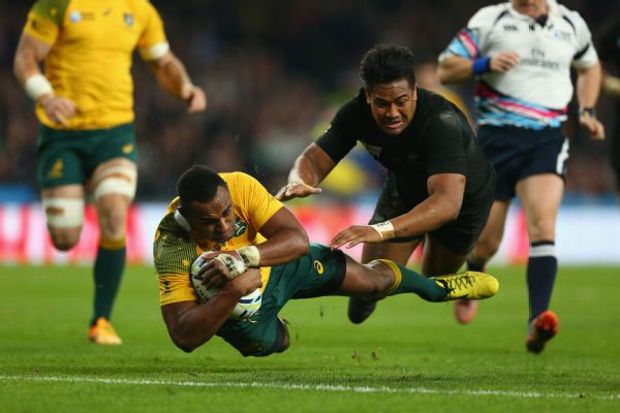|
Rugby World Cup
The World Cup that provided feast for all the senses in spite of England's failure
Tom Hamilton
November 1, 2015
All Blacks enjoying life as champions
It was the Rugby World Cup that intoxicated all of the senses: from the noise of Argentina's supporters to the smell of the fireworks at the opening ceremony. There was the sight of Georgia's unrivalled joy when they scored early against the All Blacks, the bittersweet taste of Japan's third pool-stage win and the moment Richie McCaw lifted the trophy. Not bad for a tournament where the hosts put up the most paltry of efforts. England's involvement in the final was restricted to a momentary rendition of 'Swing, Low' in the opening stages of the game, Wayne Barnes running one line and then Jason Leonard producing the trophy at the end of the match to hand it to Frenchman Bernard Lapasset, who then gave it to a Kiwi. But the World Cup's immediate legacy centres around a man who crossed codes. If you were to believe the billboards lulling you into south-west London you might think it would be an English player personifying the legacy; instead it is the Kiwi: Sonny Bill Williams. After the New Zealand's semifinal win against South Africa, he walked over to console the crestfallen Jesse Kriel, who sat slumped against a goal post. It was a touching act of humility. Then came the moments following the final when he watched aghast as a young supporter who wanted a hug was poleaxed by a security guard. The ultimate reconciliation? Sonny Bill giving the child his winner's medal. That was a legacy moment; an unplanned display showing an understanding of the values of the game -- and his importance as an individual within it -- and providing was an example for others to follow.  © Paul Gilham/Getty Images
All Blacks hail McCaw and Carter
%]It was also the World Cup that smashed records. Just short of 2.5 million folk attended the 48 games, including 89,267 for Ireland's match against Romania at Wembley, a new tournament high. In the region of 1.5m visited the nationwide fanzones with the projected profit for the tournament around the £140m mark. The length and breadth of the country embraced the tournament, with stadiums rammed from Exeter to Newcastle, from Cardiff to Stratford. Memories to last a lifetime were generated, future generations inspired. On the field, it was the World Cup where the Tier Two nations made real strides, bar the Springboks-USA match there were no real shellackings. The astonishing performance from Japan against South Africa propelled the collective underdog cause into the public consciousness like never before. Georgia's valiant win over Tonga was a highlight, as was Romania's effort to come back from 15-0 down against Canada to win 17-15. The heroics of Fiji's Nemani Nadolo, Romania's Mihai Macovei and Georgia's Mamuka Gorgodze all became part of this tournament's DNA. The tournament played host to some of the most astonishing examples of rugby bravery: Australia's 13-man stand against Wales was remarkable as was Jacques Burger's relentless effort for his Namibian side. Uruguay scored their first try since 2003 against Fiji and then grabbed another for good measure.  © Shaun Botterill/Getty Images Hansen: Victory still hasn't sunk in
%]But there were disappointments. The USA's decision to field a near second-string side for their game against the Springboks was misjudged. Samoa's performance through the tournament was way short of what we hoped for and then there was England. For all the talk of this being their opportunity to leave a tangible legacy in the country by claiming the sport's ultimate prize, future generations of rugby players would have gone away wanting to be Richie McCaw, Dan Carter or Nicolas Sanchez in their back garden rather than those sporting a red rose. They were a huge disappointment. Scotland put up the best fight for the home nations and came within a hair's breadth of beating Australia in that quarterfinal. Wales were heroic amid their ever-growing injury list while Ireland did well until they came up against the brilliance of Daniel Hourcade's Argentina. The Puma's passion -- complete with the watching Diego Maradona -- was unrivalled and they will only improve with a Super Rugby franchise next term. Refereeing also came under the spotlight as Craig Joubert's call in the dying embers of that Scotland-Australia match was then amplified by World Rugby's misjudged statement that he was wrong to give the match-winning penalty chance to Bernard Foley. The role of the TMO was also a jumbled mess at the start of the tournament, but the exact boundaries and limits were ironed out as the competition progressed. Those incidents will be forgotten thanks to the worldwide acclaim earnt by the back-to-back champions. Their opponents, Australia, were magnificent throughout the tournament and goodness knows what coach Michael Cheika would have done had he been given longer than 12 months to build his side. The Wallabies are a fine team but they could not match the beautiful ruthlessness of Steve Hansen's All Blacks.  © Steve Bardens - World Rugby/World Rugby via Getty Images To a man, New Zealand were fantastic. Who could forget Joe Moody's offload for Tawera Kerr-Barlow's second try in their evisceration of France? Then there were the Carter drop-goals in the semifinal and finale. Julian Savea's bulldozing try against Les Bleus was a joy to behold. The list goes on. Sonny Bill Williams explains medal gesture
%]Some of the All Blacks' finest players have decided to head off into various sunsets with a winner's medal in their grasp; a new generation will take their place for the forthcoming Rugby Championship and the next incarnation of this wonderful tournament in 2019. The organising body for the next World Cup would do well to replicate certain aspects of this tournament: the volunteers were magnificent, the fan zones a joy and the general fervour around the country showed an organic rather than forced passion. "Four more years boys, four more years," was the infamous sledge handed out by Wallabies scrum-half George Gregan to New Zealand's Byron Kelleher as they booked their spot in the 2003 final, but it feels like rugby is goading us now. Do we have to wait four more years for this to all happen again? Four more years to experience this nationwide joy for this wonderful sport? Japan 2019 can't come soon enough. © ESPN Sports Media Ltd. Tom Hamilton is the Associate Editor of ESPNscrum.
|
Live Sports
Communication error please reload the page.
-
Football
-
Cricket
-
Rugby
-
- Days
- Hrs
- Mins
- Secs
F1 - Abu Dhabi GP
Abu Dhabi Grand Prix December 11-131. Max Verstappen ()
2. Valtteri Bottas (Mercedes)
3. Lewis Hamilton (Mercedes)
4. Alexander Albon ()
5. Lando Norris ()
6. Carlos Sainz Jr ()
-
ESPNOtherLive >>
Golf - Houston Open
Snooker - China Open
Tennis - Miami Open

